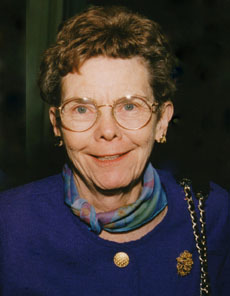
Sally Mead Hands
The late Sally Mead Hands’ relationship to English and the University of Wisconsin-Madison ran deep.
Her mother, Louise Durham Mead, graduated with an English degree 1925. When Hands enrolled at the University, she, too, majored in English, added liberal doses of history and joined the Delta Gamma sorority before graduating in 1948. Although they did not graduate from the University of Wisconsin-Madison, Hands’ daughter, Louise Murphy, and her granddaughter, Nora Murphy, also became English majors. Louise Murphy taught high school English, and Nora teaches English at Front Range Community College near Boulder, Colorado.
Hands’ connection continued as a member of the English Department’s Board of Visitors and the Bascom Hill Society. The philanthropist who loved a cold beer, freshly grilled bratwurst, a good Cubs baseball game or a fall Badger football game cemented her enduring ties to the University with a significant estate gift to the English Department. Her generosity will especially benefit future generations of first- and fifth-year graduate students, paving the way for the best and brightest to attend the UW-Madison.
The Hands gift demonstrates the growing influence of women’s philanthropy that has blossomed since the late 1980s, said Martha Taylor, a vice president at the University of Wisconsin Foundation. “Previously, women were sometimes ignored by institutions because people thought that women volunteered and men made all the decisions about money. Studies show, however, that couples are the most common decision-making unit for philanthropy, with women playing a major role in gift decisions.”
Women have different interests than men. If women want what they believe in and what they’re passionate about to happen, they need to make it happen.
Nancy Borghesi
Part of the women’s philanthropy movement is encouraging women to speak out about what they want to support, said Nancy Borghesi, a member of the UW Foundation’s Women’s Philanthropy Council. The growing number of women philanthropists reflects an evolution of women’s roles at work and home and in economic decision making, she said.
“Women have different interests than men,” Borghesi said. “If women want what they believe in and what they’re passionate about to happen, they need to make it happen.”
Borghesi is especially interested in how compelling events cause women to start giving. In her case, she made her first significant gifts after she lost her second parent and wondered how she could use her inheritance to make a difference.
Hands, a patron of the arts, education and environment, had a generous and compassionate spirit and wanted to make the world a better place, Taylor said. “She had an infectious laugh and a twinkle in her eye that conveyed her deep passion for life.”
Hands, who was 82 when she died in 2008, was grateful to the English Department for the opportunities it provided for her and other women, Taylor said. She believed the department gave women an outstanding intellectual background, and she also was pleased to be asked to serve as an inaugural member of its board of visitors.
Women have been generous to the University in the past, but they’ve often wanted to remain anonymous, Taylor said. The UW Foundation created the Women’s Philanthropy Council in 1988 to encourage women to support University projects that interest them in their own names. “Now, women are becoming more open about their giving in order to inspire others,” she said.
Women have more financial resources, whether inherited, married or earned, than ever before, Taylor said. Women also represent 52 percent of the UW-Madison student body. “With more education comes greater income,” she said. “Women will increase their philanthropy as their financial clout grows to match their long-standing tradition of volunteering.”
